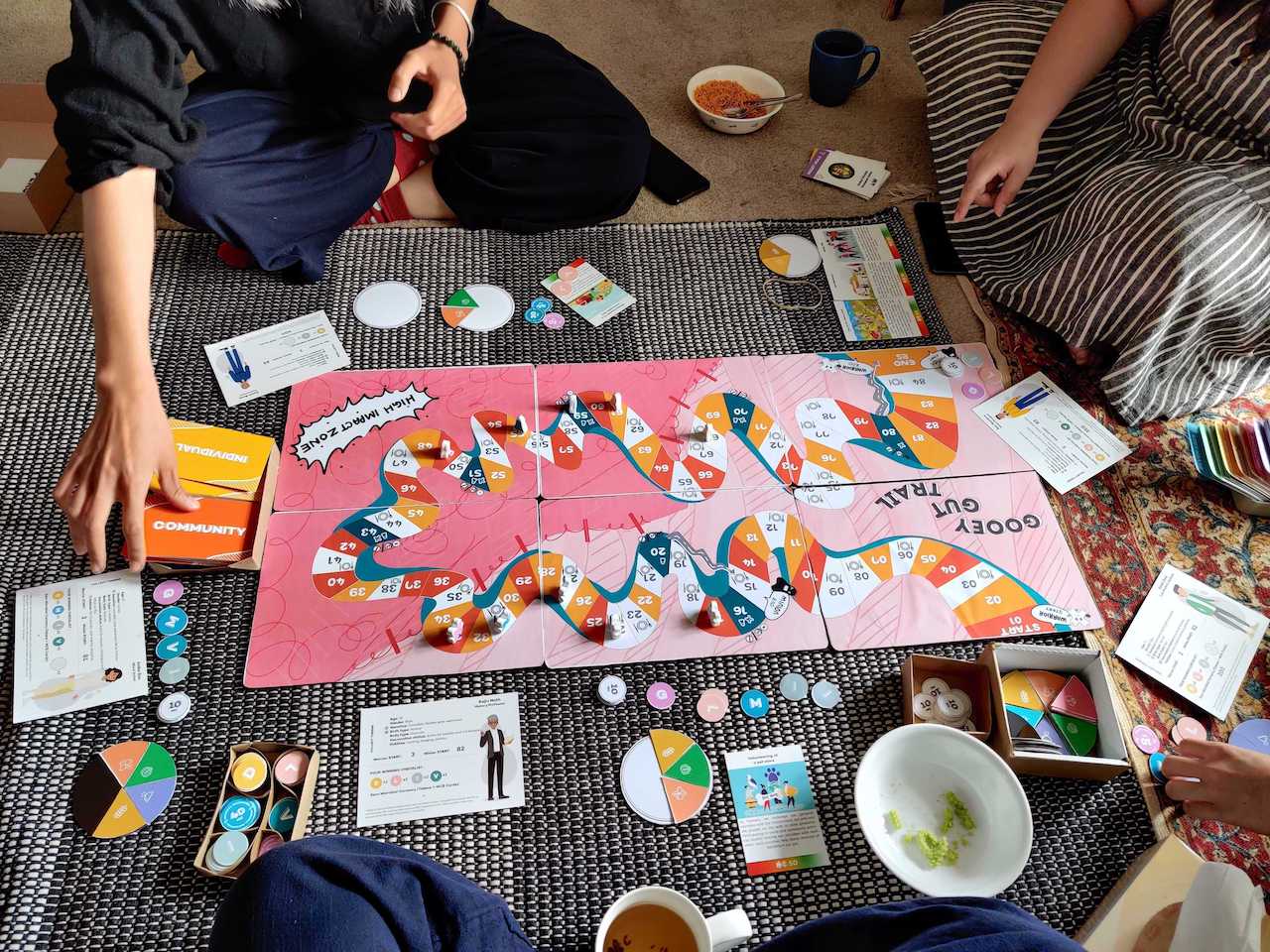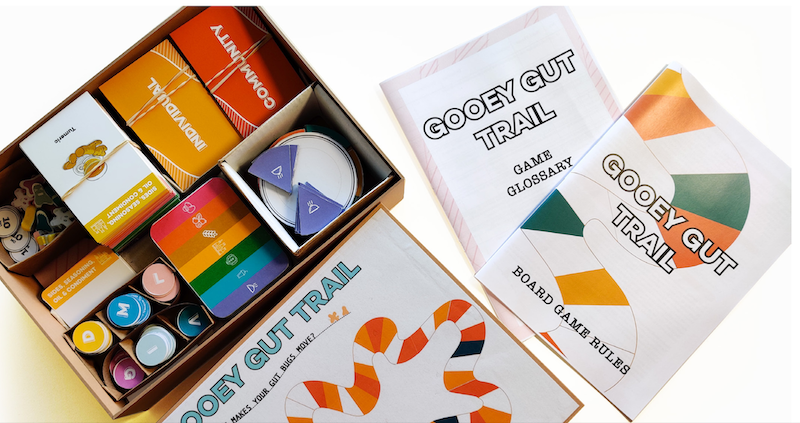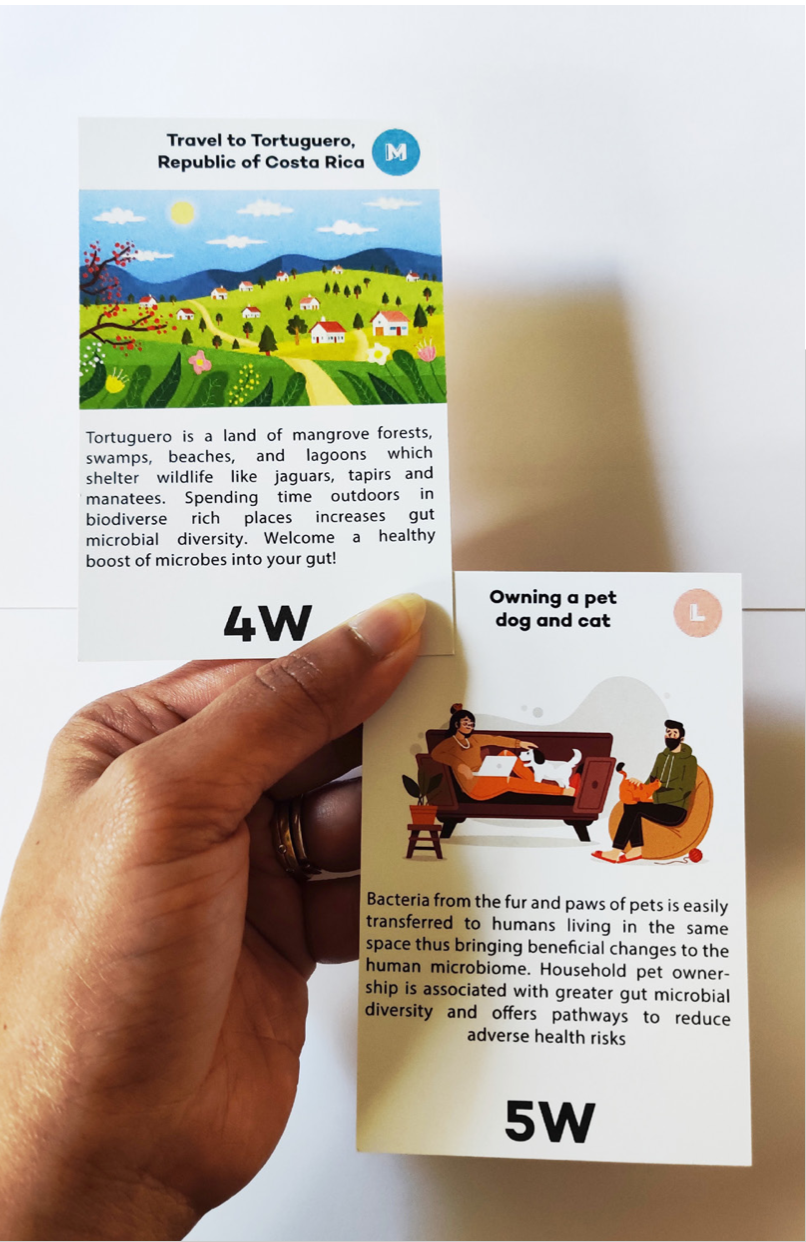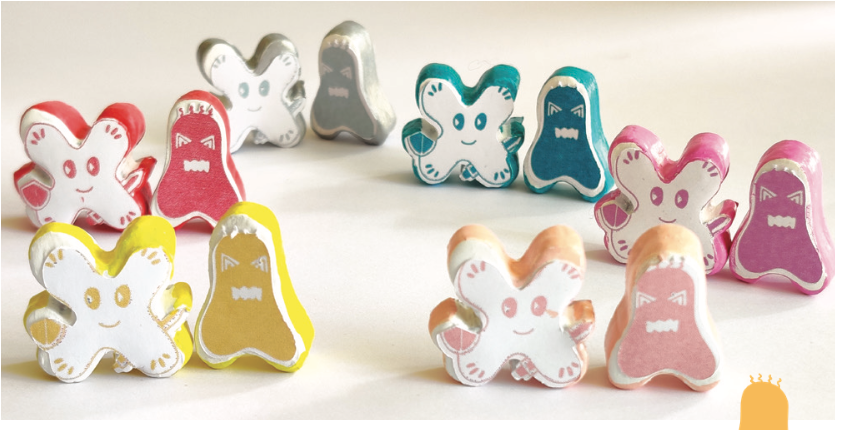
Gooey Gut Trails
PhD Research Gut Health Social Play
Gut health is currently a widely used term in social media,
however, the understanding of factors that influence gut health
is still at a nascent stage, amongst the general public.
Furthermore, the traditional information sources on gut health
like journals, blogs, news articles are often scientific,
complex to comprehend and rarely appeal to the larger
population.
Gooey Gut Trail is part of a PhD research project that explores
how interactive play experiences can be designed to engage and
foster reflection on human gut health. The game extends beyond
dietary aspects and brings attention to a wider set of factors
that influence gut health. It uses card decks, meeples, factor
tokens, and the game board to simulate real-world scenarios and
activities that impact gut bacteria. GGT leverages design
fiction to make the game relatable and creates a reflective
space for gut health understanding.
Made with by Nandini Pasumarthy, Yi-Ling (Ellie) Tai, Dr. Rohit Ashok Khot, & Dr. Jessica Danaher
Nandini Pasumarthy, Yi Ling (Ellie) Tai, Rohit Ashok
Khot, and Jessica Danaher. 2020.
Gooey Gut Trail :Demystifying Human Gut Health
Through a Board Game. In Creativity and Cognition (C&C '21). Association
for Computing Machinery, New York, NY, USA, Article
19, 1.
Nandini Pasumarthy,
Rakesh Patibanda, Yi Ling Tai, Elise van den Hoven,
Jessica Danaher, Rohit Ashok Khot
Gooey Gut Trail: Board Game Play to Understand
Human-Microbial Interactions. Proceedings of the ACM on Human-Computer
Interaction. 2022. 1-31.
Literature Review
Duration: 1 yearCase study 1
Duration: 1 yearCase study 2
Duration: 1 yearVideo recording of ACM Creativtiy and Cognition presentation.
Grounded.
This research is grounded in the literature on gut health, sociology and game design concepts. Research suggests that the context in which information is presented, has a significant impact on our understanding of it. Our focus on engaging players with gut health information through play remains at the level of “functional scientific literacy” - which posits that individuals should possess minimum practical skills informed through science in order to make thoughtful decisions and function effectively in a particular setting. In contrast to the traditional sources of information on gut health, we focus on engaging players through playful experiences that are grounded in scientific literature and game design. This research facilitates learning about the gut and its interrelation to factors like diet, lifestyle, environment, emotions, thus preparing players to take this experience and the gathered insights into their real-life practices
Contextual.
Research suggests embedding complex science topics into the social and societal constructs of their occurrence so as to offer people a contextual understanding of the topic being communicated. The context in which information is presented directly affects the way it is perceived by an individual. It further decides the validity of information gathered, as well as its translation into real-world actions. The complexity of science topics like gut health may be appealing only to a niche crowd, for example, scholars in the medical field. However, health implications stemming from a lack of awareness on the factors influencing gut health are far-reaching. As such understanding the role of socio-spatial elements and the contexts through which factors affect gut health can play a vital role in designing playful experiences to engage with gut health factors. We integrate the real-world scenarios like bio-diverse landscapes with rich organic soil, forest air, and public spaces that affect our gut health in the game play to provide a contextual understanding of our gut health.
Refined.
The game was play-tested by the research team during the design phase using hybrid tools i.e., part-physical and part-digital. The components of the final research product were partly printed at home and partly through a commercial vendor. Other components like game meeples, food plate, wedges and component trays were handcrafted at home. The game was designed using sustainable materials such as cardboard, air dry clay, MDF board, linen bag, brown craft paper, magnetic sheets and repurposed cardboard containers to hold game components. The design goals of GGT were in alignment with the design ideals of our team that is focused on reducing the impact of our design choices on the environment. The final research product is fully-functional, aesthetically-appealing and reflective of the theme which resulted in a seamless user-experience and meaningful feedback from users. Testing the final game through a field study revealed that users gained a new-found understanding of the intricacies involved in gut health. The user-experience of the game was positive and users reported having an enjoyable experience that conveyed scientific insights through game mechanics, interactions and aesthetics. We further noted that important facets of the design contributed towards an increased awareness in participants, causing some participants to reflect upon their personal habits that influence gut health while motivating behavior change in others.

Overall, I enjoyed very much reading and ‘seeing’ this pictorial. The account of the design process is honest, and the design decisions are well justified and carried out in a truly multi-disciplinary way. I also commend the authors for addressing this often tabooed topic and for doing so with respect and playfully, avoiding to put the emphasis on illness or malfunction and towards normalizing a part of life.
Annoymous Reviewer
ACM C&C 2021




